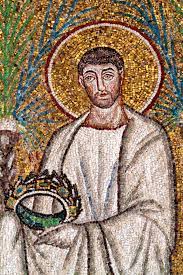Feast of Saints Cornelius [Pope] and Cyprian, martyrs
St. Cyprian was originally a pagan public speaker and teacher from Carthage [in present-day Tunisia] who converted to Christianity around 246 AD. He studied Scripture and the writings of the first great Latin theologian from North Africa, Tertullian. He grew so rapidly in holiness and knowledge of the faith that he was appointed bishop of Carthage only two years later. He was martyred there on 14 September 258 AD by the pagan Romans, during the reign of the Emperor Valerian. He is considered the first bishop-martyr of Africa. As one of the first Saints of Africa he, along with St Augustine, are considered Patrons of the Society of African Missions [SMA].
His writings that survive are principally letters and other short treatises, including De Catholicae Ecclesiae Unitatis (probably dated 251 AD). This deals with the Unity of the Catholic Church and the importance of the Bishops as safeguards of this unity.
Before his execution, the Governor of Carthage accused Cyprian of setting himself up as an ‘enemy of the gods of Rome and our religious practices’. He then read out the sentence of death to which Cyprian replied, “Thanks be to God”.
He is honoured by the Western [Roman] and Eastern Churches on 16 September and by the Anglican Church on 26 September.
Fr Kevin O’Gorman, SMA, presents here a short reflection on what martyrdom means as we celebrate his feast day, which he shares with Pope St Cornelius. Cornelius was badly mistreated by the Romans and exiled to Civitavecchia, near Rome where he died in 253 AD. Though not actually killed by the Romans, the Roman Christians venerated him as a martyr because of the sufferings he endured as Pope and during his exile.
Here is Fr Kevin’s text:
“After the Exaltation of the Holy Cross and Our Lady of Sorrows we celebrate – indeed confess – the memorial of Cornelius and Cyprian, bishops (the former of Rome), both martyrs.
I say confess because sadly we hear and see people all over the world suffering for their faith in the crucified Christ and imitating him by laying down their lives in sacrifice. At the bottom of the page in the Liturgical Calendar there is a quotation from Pope Francis about participation in the Paschal Mystery in the liturgy; today the martyrs teach us how they have participated in the Paschal Mystery through their lives and through their deaths.
In today’s reading from the Gospel of Luke Jesus uses familiar images – a tree and a house. The principle is simple – ‘there is no sound tree that produces rotten fruit’. Jesus refers to this so many times as he does to the house built on a solid foundation. Throughout the summer we have seen images in so many places around the world of flooding and the devastation caused, houses, streets and villages swept away by the force of water flowing into them. There is no escape from the effects of environmental change. Like the examples in the Gospel, tree and house, without proper foundations, nature and humanity suffer catastrophic consequences.
The suffering of martyrdom is somewhat different. While it is caused by evil in the hearts of others, it is a witness freely chosen. Martyrs make their own way, conscious of the cost of discipleship.
Paul, no stranger to suffering for the sake of the Gospel and himself a martyr in the end, makes an amazing confession, claiming that he himself is the greatest example of God’s ‘inexhaustible patience’. For Paul the mission of martyrdom is mercy. It is the supreme sign of sharing in the love of Christ who ‘came into the world to save sinners’.
Rooted in Christ the tree of life and founded on Him the true home of God in the world, martyrdom looks not to human failure but to heavenly fulfilment.”
Fr Kevin O’Gorman, SMA, Cork

